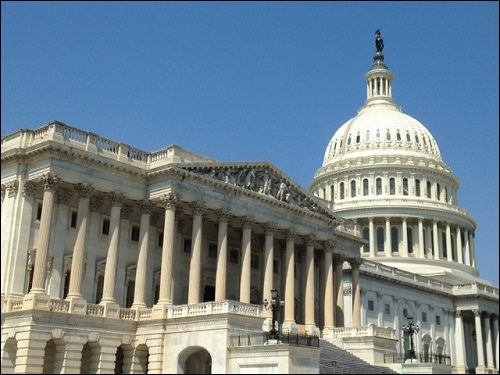More than half of all House members, including majorities from both political parties, told the chamber’s chief tax writers they want to come up with a way to head off the future insolvency of the Highway Trust Fund.
While their letter did not specifically endorse a gas tax increase or any other revenue option, it did ask leaders of the Ways and Means Committee to come up with a “long-term, dedicated, user-based revenue stream” that will keep the trust fund solvent.
Reps. Sam Graves, R-Mo., and Eleanor Holmes Norton, D-D.C. – the chairman and ranking minority member of the Transportation and Infrastructure Subcommittee on Highways and Transit – led the letter-signing effort that won signatures of 253 House members in all, with a push by construction industry groups.
Graves said he sent the letter June 12 to leaders of the Ways and Means Committee, which originates tax legislation and is trying to craft a major tax overhaul plan.
That puts the House members on a similar course as the board of the American Association of State Highway and Transportation Officials, which last month also called for a permanent fix to the Highway Trust Fund.
But while AASHTO focused on making such a fix part of any new infrastructure investment program, the House letter writers urged that such action be part of a tax plan.
Bud Wright, executive director of the American Association of State Highway and Transportation Officials, commended lawmakers for their push to bolster the Highway Trust Fund. “That trust fund is the federal government’s largest source of ongoing infrastructure investment, but it has long needed Congress to improve the dedicated revenue stream in order to meet investment goals that lawmakers authorize.
“Now, with national policymakers intent on producing both an infrastructure bill and tax reform, Congress has an opportunity to make long-lasting improvements to the trust fund, and it is indeed heartening that so many House members signed onto this letter.”
The letter noted that past revenue improvements to the trust fund, which pays for all federal highway programs and most federal transit spending, have come within larger tax reform and deficit reduction packages. It added that as Ways and Means “continues to pursue tax reform, we urge you to include a long-term solution to the HTF and we stand ready to work in partnership to reach this critical goal.”
Some in both Congress and the Trump administration – including President Trump – have suggested that the tax and infrastructure plans might ultimately be paired together, so that the tax portion would include revenue to cover the added federal project investments.
In a press release, Graves said: “The president has made rebuilding our transportation network a priority, and rightfully so. But, instead of thinking a one-time, trillion-dollar investment would solve our long-term infrastructure problems, my focus is on making sure we’re being responsible in how we plan for and fund projects in the future.”
He added that “the best thing we can do for this country’s transportation infrastructure is bring long-term certainty to the Highway Trust Fund. What we need is a modern, sustainable system that keeps revenues flowing so states are able to invest in projects as they come up, not once it’s too late. As Washington focuses in on tax and infrastructure reform, we have the perfect opportunity to fix the HTF. The overwhelming support generated on this letter is a critical step in this process.”
The Transportation Construction Coalition, which includes 31 industry associations and construction unions, had helped by stirring its own members to press their lawmakers to sign the letter. The group issued a press release the same day as Graves, commending the letter signers for taking that action.
In the letter, lawmakers noted that the trust fund spending levels are fully funded by dedicated excise taxes and general fund transfers only through fiscal 2020, when the current five-year authorization ends. So, to head off a sudden collapse in federal funding of those programs, Congress would need to either pass a new multiyear bill by then or resort to a series of short-term extensions.
Before Congress in late 2016 passed the current five-year bill, it had gone through a disruptive series of short extensions, which left some states taking planned projects off their bid schedules over concern the federal dollars might not be available when the project bills came due.
Graves, Norton and the other signers warned about the impact if lawmakers do not shore up the trust fund. “If states are unable to rely on timely reimbursements from the HTF for work performed,” they wrote, “projects will be halted, improvements to road safety and congestion relief will be jeopardized, and America’s infrastructure will fall further behind the rest of the world.”

